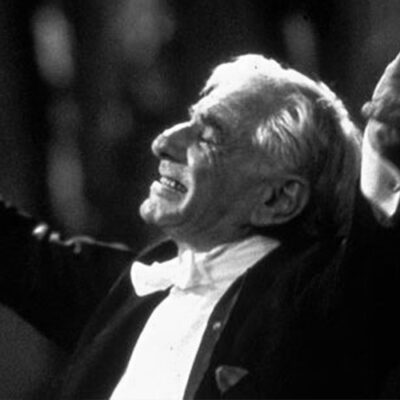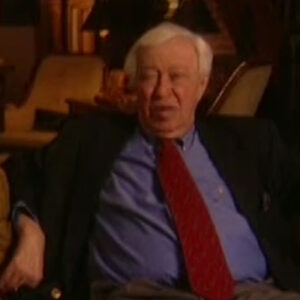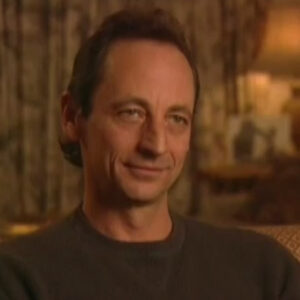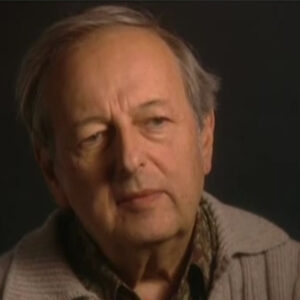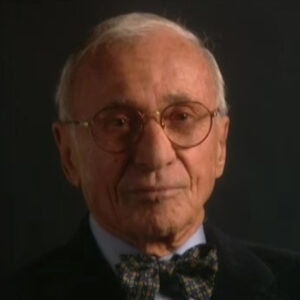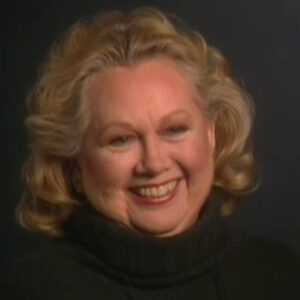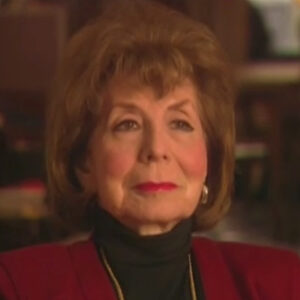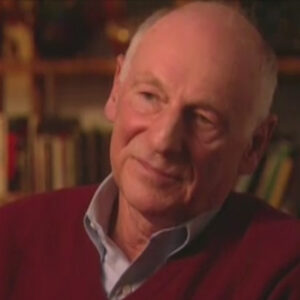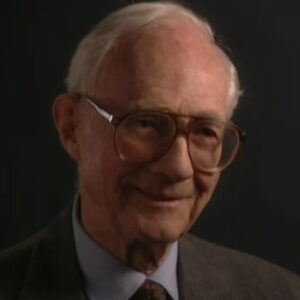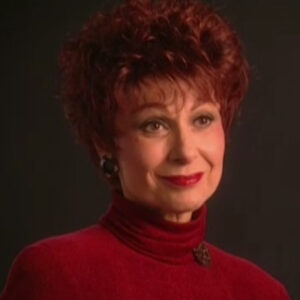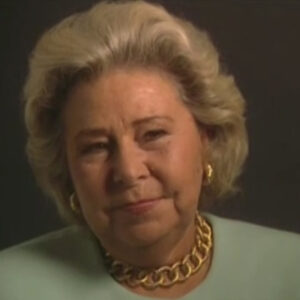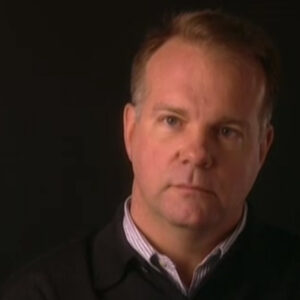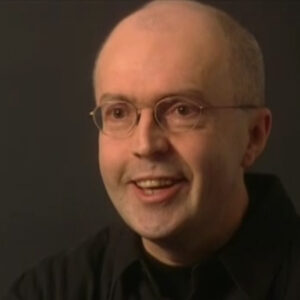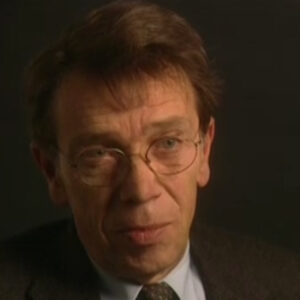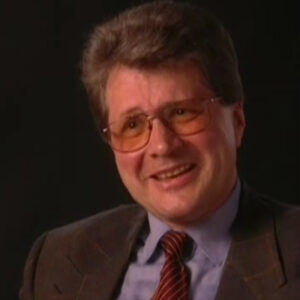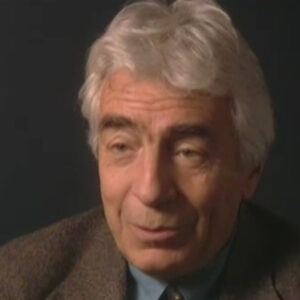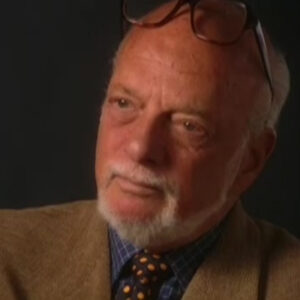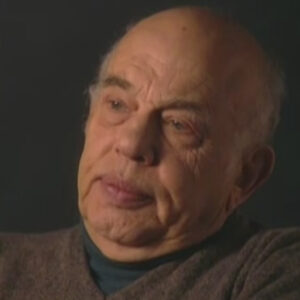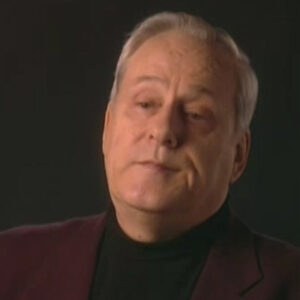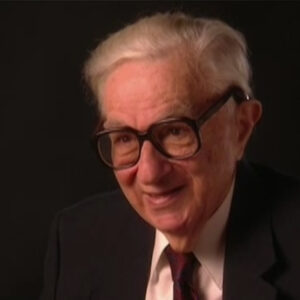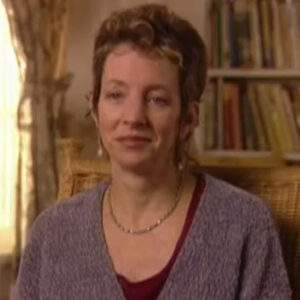Speaker What do you remember from your first meeting with? Right, what’s the first memorable thing in terms of your connection? I think it comes with a strike comes out for you.
Speaker Well, we actually. When he came to and Felicia and Shirley and whatnot came to see me in a play and he said, Oh, thank God you can act. I mean, we become friends.
Speaker And he just wanted to make sure, you know, that, like, that was like Lenny always, you know, he was he was very, very good. And then sometimes he could really suck it to you and make you very upset, which he did many times. On the other hand, he was a sweetheart. I mean, it’s like everything about him.
Speaker This way. That way. Ambivalence. You know, I mean, conducting.
Speaker Serious Broadway, everything about his life was double edged, what you know, how do you become friends and say, well, oh well, oh God, I’m not going to say when, I mean, it’ll date me. But anyway, it was I was at Harvard and I had asked Lenny to make a speech in front of the Harvard Zayouna society.
Speaker And he turned me down and rather and I wrote this letter to my father who knew Lenny. And and I got this terrible call from Helen Koch saying, How dare you, you know, more and ordered me to appear at the first time I ever heard him conduct Mahler second in Boston and was, you know, taken backstage and given a what do you call it, a lecture on my bad behavior. And I said, how dare you not come and talk to the young Jews at Harvard?
Speaker What do they think of you? I mean, I wrote that letter, my pop, and he said straight off to Lenny.
Speaker Did he did he know?
Speaker He of course he didn’t.
Speaker Naturally not sure his business was filled, whatever. I mean, that’s definitely.
Speaker I also remember that, you know, standing and applauding at the end of the Second Symphony was just incredible. And some ones that are you his brother, describe your feelings watching him and describe him conducting you describe your feelings about.
Speaker The first time, well, not the first time, but all the time was that.
Speaker He was so full of the music and so not anxious, not the word, but so wanting to make you understand what he felt about the music.
Speaker And it was in his body language and in his dancing and his so that in a funny way, he. He communicated what he by his conducting, not by his conducting itself. I’m not saying that commercially music, but the way he conducted was to let you know how he deeply felt about whatever it was that he was conducting. And that that’s that’s extraordinary because, I mean, somebody like Boulez will just stand there and go like this and be gorgeous music. But Lenny got so involved. I mean, look like he got an almost everything or anything, you know.
Speaker Oh, boy. Well, you know that I was going to ask you this, but I’m just curious because I have been just astounded in all the research and discovering how many critics really, you know, compare this part of play. What what why do you think that was?
Speaker Well, I think they thought it was showing off.
Speaker And the.
Speaker Why would you think showing off?
Speaker Well, I mean, you know, he jumped or he stamped or.
Speaker I mean, I have got this pirated recording of Carlos in the media, and you can hear him going, boom, boom, boom, on the record, you know, stuff like that. That that was a great experience for me. Well, I understand there’s a story that that that she, the conductor of media, had gotten sick and the conductor and she had heard he was touring Europe and she had heard him on the radio. And so that’s the guy I want. And then he said, I can’t do it. I don’t know this score. Whoo hoo! What media? You know, and he told me that what he was going up to Milan with the score, and it was so full of dust that he had an asthma attack. And but he he was very impressed with that lady, not only for artificial intelligence, because he tried to make a big cut in one of her big areas at the end. And he said she understood right away. She understood why I didn’t make, you know, that whole thing about her temperament. But she was really intelligent about this. And he said, but then there was the other side of politics.
Speaker At one point, the chorus didn’t get off the stage and she turned to him and said, Is this deal with Carlos Ahmadiyya with the chorus on me?
Speaker I can go, you know? So again, the both sides just just looked at me and said he didn’t know.
Speaker He had never even heard of the deal. And he was where he had to learn, like in two days.
Speaker Yeah, love that you know that well, yeah. He had never heard of the opera or Caribbean or anything like that, and and he had to learn that score in a few days. And that was incredible. And then the other experience, of course, was when he worked with. Well, you know, when he we went together, Felecia, I.
Speaker To hear College Traviata, and that was when he got into real trouble with the critics because the critic on the Hill Tribune said that the tenor was flat. And then he said, I think a music critic ought to know and wrote this letter with a different from giving flat and being sharp, is he never got a good review in the Herald Tribune again. I mean, you know, but that’s the slutty doing what on the impulse and just just doing it.
Speaker What do you know about the artistic relationship with Lenny and Carlos, which is what they brought to each other, what they said about each other? They felt about each other.
Speaker We’ve got to see he was just amazed, I mean, at one point life, at one point he said for me, she’s the greatest artist in the world today and. He was very impressed with her intelligent and her musicality and her real knowledge of the style in which she which she revived these operas that had not been done for so long. I mean, just it’s a funny coincidence that she became famous overnight from from from replacing a character who was sick and singing pretty funny after seeing Wagner going from huge voice to this, you know, lyrical Aratula. And Lenny got his start replacing Bruno Walter. I mean, you know, it’s there’s nothing new under the face of the sun. And then they and they coming together like that with, you know, just asking for him and not knowing who he was and he not knowing the score at all. I mean, that’s that’s something that’s more than dramatic. It’s it’s funny and it’s and it’s wonderful.
Speaker I mean, what did he bring out in her performance that hadn’t been there before?
Speaker Well, I don’t know that he brought out, except that he she felt I know this for a fact, that he understood the kind of music and the kind of of of what she was.
Speaker After which was a kind of expressivity in these kinds of parts, the Baldini, the Donizetti, the Roshini that had never been done before and.
Speaker They have some good temperament, so something about their temperament. They would have made them natural cohort’s.
Speaker I’ve.
Speaker I used to make fun of her, too, you know, he would make fun of her accent, you know, oh, there she is with a rhinestone glasses on, you know, and stuff like that. But, I mean, he adored her. What more can I say?
Speaker Well, but they were both very dramatic theatrical kinds of people.
Speaker And that, of course, her. With his kind of with the music of the score and both scores he was describing for me the the how the end of Sonnambula, that Visconti had this idea that it should be that she should come on, not as this little peasant girl, but as a diva of the 18th century with long white gloves and blah, blah, blah, you know, diamonds on the thing. And then she comes on the stage singing this last aria and on Friday and the lights go down and she’s alone on the stage with the chorus disappears all in peasant costume. But she’s in this like long gloves and the diamonds and the hair and sings it. And then he said for the color bar, which he wrote the cadenzas for, which were very difficult and high up on the late start to come up on stage and let her come up. And oh, and as she was heading and shopping on the high seas, he said the lights came up in La Scala and the whole place was ablaze and he thought it was just incredible. I mean, there was a meeting of news and mind and music and everything.
Speaker Right. Could you just say one thing? That planning was the first American conductor to be conductor, which is true.
Speaker OK. Yeah, I mean, this all happened when he was touring Europe and and I gather that I heard him on the radio and I want that man. And so he was literally the first American to conduct at that shrine of Italian opera Muscala, talking about an issue you had offered money to the French.
Speaker Felicia was my best friend, I guess.
Speaker I mean, I moved out of the Dakota when she died, I just couldn’t I couldn’t stay there anymore. She she helped me hang every picture, you know, and she was as a matter of fact, right after that, I mean, my agent said to me, I can’t stand the way you are now and I want you to come to therapy. And I did. And I remember after a couple of months, I began talking about her and she said to me, somebody did love you.
Speaker And I guess she did. Are we?
Speaker We really we’re very close. I love Felicia. Very much and got a terrible fight with Lenin over that when they decided to do what I think was the most erotic activist alive, when he left for some sort of crazy principle that he thought he was asserting, I don’t you know, just I just I thought it was crazy and stupid and everything I could.
Speaker But Felicia, Felicia, God, I mean, this is the kind of thing we had, it’s all a party, you know, and we were we were dancing together and this party is not going well. Would you mind if I pushed you in the swing before I said no. But let me take my watch off first, though. So we dance. And she pushed, but I held on and she went in the pool and then everybody went in. You save the party, you know that.
Speaker She also, you know, she was the one who introduced me to colors, actually in Paris, we were coming back from south, but were it all been together as a family? And she said, I know you were a great admirer of this woman. I’m going to arrange for us to meet. And she and Alexander and, you know, all went up to to Carlos’s apartment and I was like trembling in front of, you know, not even living. And Felicia said, this is my this is my daughter, Nina. This is my son Alexander. And then she pointed me out and this is my retarded stepdaughter.
Speaker And but she knew her customers because college didn’t get it for about a half an hour. That’s not your you know, and that’s been a family, you know, family sort of in-joke that you call us when we get it. Yes. At one point she said, that’s not your stepdaughter. I was until Alexander got me a vodka. I couldn’t say a word.
Speaker It was like meeting there. Yeah, sure. Yeah, got it.
Speaker Yeah, well, that’s what we had back then. Felicia, how did how did you become friends?
Speaker Well, as I say, they were all over this thing and we just became and we worked together.
Speaker We we did. And we’re the first together, she was wonderful as the French princess, and we did the Christopher Schultz play and she was a wonderful actress and she was a, for a time the reigning queen of Life TV. Oh, and as a matter of fact, it’s a birthday present once. When he got kinescopes of some of her some performances and showed them at a birthday party for it was wonderful to see them. How did you feel about seeing them? And not very good. Not at all. But she was a very good actress. Very, very good indeed.
Speaker Did she why did she leave? Why did you start being an actress?
Speaker Her children, her family and Lenny, I mean, I know she didn’t like the idea of being Mrs Conductor, but she once told me that she went shopping with Oh God, what’s his name? Famous German conductor and the wife. No, no, no, no. Cripps, Joseph Clip’s, I think it was. And she’s admitted Cripps that she told me about the shopping. I never want to be admitted crêpes. I mean, she didn’t like staying in the dressing room afterwards. She said, OK, bust that out. We will we will go leaving Lenny to be to hug everybody else, you know. Like living in the green room after. Oh, well, first of all, he would disappear into the bathroom and then he would stick his head out and it would be, you know, half undressed and he was there and full time and go back and come out. And then he would be given his cigarettes and his scotch and then he would greet and talk and go on for it could go on for hours because there were lines outside the dressing room was incredible. But for you know, if you’re sitting there, it’s it’s not very interesting. I mean, you know what? She she she had a firm grip on things.
Speaker But what what do you think?
Speaker Some of the ways in which this had an impact on his taste, she was elegant, she had a great influence on his visual learning, you know, was smart in so many ways. But really, I have to say this visually. I mean, the things he would wear and Joosep.
Speaker Bolton, that we must not you know, and she was always, you know, that’s one of the certainly influences and also she played the piano and they could play together and she was very smart and almost as well.
Speaker Well, nobody could be as well read as Lenny, but she was, you know, very, very also very bright, very intelligent, very well read.
Speaker What did they find the time to read? God alone knows. He will hear it exhaustible energy, which is what comes over and it’s going to come, of course, to that energy, you know, before is what propelled him to enter into the way he, you know, conducted and showed you with his body what the music was all about. Felicia. Lenny, what a special feel when they had that brief split up.
Speaker Terrible. When they split up, it was just the most awful thing. I was sort of stuck in the middle between them, especially when it came back. I was still living there and it was like, you know, I got for breakfast and there would be Lenny and Felicia and I would be sitting in the middle. And she was angry then. And I don’t blame her. It was stupid.
Speaker And on top of it, again, you know, Lenny and I were redoing the Kaddish, which he had originally done, and then he rewrote it for a male speaker, which then I did all over the world with him. And she was sort of angry about that, too, and took it out on me a little bit. You I just don’t you know, that was my part, you know, stuff like that when he read it.
Speaker And I thought because according to Jewish law, the woman is not supposed to say Kaddish.
Speaker It is. And I always thought that that courage really was a dialogue between Lenny and his own father, not as in the scriptures, you know, talking about God. I said, Lenny, this is about you and your poppets, like and when we did first did it in Israel, my father was dying and came in a wheelchair to go to the concert hall.
Speaker He said, you know, I think that that informed that whole thing that a lot of people don’t understand how personal that that that piece is to money that his conflict with his father.
Speaker Came through.
Speaker And me ask, you want you in Israel. What year were you?
Speaker Oh, God, don’t ask me to remember. I got to be seventy three. Seventy two when I was when I was young. Yeah. 72, I guess it was.
Speaker And what was the experience of being with. What was it like to be in Israel with Lenny.
Speaker Or any specific stories about that?
Speaker No, no, just just the.
Speaker Just the.
Speaker The emotional impact of the whole experience just, you know, rehearsing it before, it didn’t mean much.
Speaker But there in Israel, just everything came out, everything right from me.
Speaker I think it’s probably one of the best things I’ve ever done in but Glenys Lenni everywhere, that’s the other thing you know about Lenny, that he didn’t cut his size too because he was in Israel or, you know, it was he was he always that was that was one of the lovely things about him. One of the impossible things about him.
Speaker One of them, you know, what is it you said, Oh, I want to go.
Speaker And I said, yes, as a matter of fact, when I when I at the actual. Funeral ceremony in the living with the Dakota, said Lenny, when he was good, he was very, very incredible.
Speaker And when he was that, he was very, very incredible. I mean, we were all at once.
Speaker My wife never forgave him at that. We were all a tossup with colors, you know, in 60, whenever that was the last performances and we were all in a box and we went out for this party afterwards. And Mark was Mike Nichols, who dance with Felicia. And I danced with Susan Sontag, who was in love. And there was my ex-wife, Susan, sitting there and she said, Aren’t you going to dance? And he said, no, you’re too tall for me. You know, she never forgave him for that.
Speaker I don’t know what is the example of Leonard being very, very, very good.
Speaker Well, he would, he would. He really took care of his relationship with friends.
Speaker He would always make Christmas or a birthday very personal and he would write something very personal to you or to anyone, you know, to really close close friends. And you felt, my God, I’m something special with Lenny, you know?
Speaker And I think a lot of people felt that, you know.
Speaker He could make you feel, and especially I tell you with Lenny, when there were a lot of people, he was impossible, sometimes really impossible, but one on one.
Speaker He could really relate it and really talk seriously and and wonderfully. And of course, the last two weeks that I spent at the Dakota before he died were extraordinary. I mean, I remember actually the day before he died.
Speaker He said.
Speaker What was my life all about? Did it mean anything? Did I make people happy? I mean, I was stunned at this response, just stunned that a man of that fame with that charisma should suddenly feel that everything was meaningless. But we all feel that way when it comes to that. I don’t know. I remember also the. A few weeks before he died, we were about, I guess, about five days. What was he, 74? And we were having breakfast together and he seemed rather pensive. And I said, what’s the matter? Well, what do you think about he said, I’m writing my eulogy cut down in the prime of his youth.
Speaker So that’s a great first line. I mean, what do you say after that, huh? That’s up to you.
Speaker Hard to talk about it.
Speaker That’s a big hole. Yeah, big hole in all our lives as sort of social failure. Both of them, they were my friends.
Speaker I love them both and I felt that so strongly. I think it’s one of the things this weekend I was so moved by this.
Speaker You’re making me cry, baby was just the reality of any parents or boyfriend sees at all that I really felt that these kids.
Speaker The huge hole in your life. Oh, yeah, I mean, no question about that. Well, then, welcome back. Welcome back. What are the ways you and Lenny worked together?
Speaker Oh, we did. That’s what I’ll give you an example. When it was terrible, we were doing at a A of Stravinsky and I was the speaker. That was the first time we worked together with the Boston Symphony and had known that I was also doing a lot of voiceovers. And there we were at the first read through. And now you’re going to hear the voice of Greeno recite the words Jean Cocteau. And I was in front of the whole cast of very famous singers.
Speaker I wanted to kill him. I mean, you know, I think I mean, the voice of other other things you did together.
Speaker Do you have memories of.
Speaker Well, we took after the first performance of Cordish that we went all over the world together. We went to Hiroshima, to Vienna, to Budapest, to Athens, to Germany. I mean, you know, that was sort of a steady job with Hiroshima, a special event, a very special it was the four anniversary of he or she was very special event. It was the fourth anniversary of the closing the atom bomb. And he felt that the Courage Symphony was was quite appropriate to be done in Hiroshima on that date. And I remember we all got up very early in the morning when Seiji Osama was also there. I had a special sort of ritual meeting and I was six in the morning and we all gathered together to for this Japanese ritual. And then that was an extraordinary experience being there.
Speaker Wesley, who was there, who did the what was the weather, the official Japanese there.
Speaker Like, just every day, yeah, like like Tusker says nonsense. No, I don’t know, I really doubt you had a wonderful Shirley Temple story, but oh well this I think was this perhaps he was already sick and was already in great pain when he invited me to come to Prague. And Shirley and I flew over to Prague together. And it was awful because you could see the effort it was taking. And but then we were invited, as usual, to go to the ambassador. And the ambassador happened to be Shirley Temple, Shirley Temple Black ambassador to Czechoslovakia, and she introduced Lenny. And don’t you think Lenny really began to sing and dance on the good ship lollipop in front of every party? I couldn’t believe how she responded. Well, she was just embarrassed, of course, was wasn’t anywhere, as you know, he did. I told you Lenny was Lenny every place. I mean, it didn’t make any difference that she was the ambassador. I mean, he was, Lenny, oblivious to, you know, he wasn’t, you know, not oblivious. It was just acted on impulse. What came first to his mind was that there was our favorite child star that he remembered doing and the good lollipop. And he danced and he sang. And we also. Lenny, come on.
Speaker You know, but that was Lenny.
Speaker Do you remember any other traveling and little anecdotes with Lenny, like traveling on luggage things?
Speaker Oh, well, to travel with Lenny was an experience. It makes traveling ever afterwards impossible. I mean, first of all, you don’t have to do anything. No. One, it was the Concorde, right. Number two, when you got off the plane, your luggage was taken care of. Nobody had to carry anything. I mean, everybody bowed and scraped for the great maestro. And it makes traveling very difficult now without him. But it was kind of marvelous. It was really a very luxurious experience.
Speaker And he always did have in various cities. He had various hotels.
Speaker Oh, yeah, I’m sure. Especially yes. Especially in Vienna at the Soho, where we also performed with you know, we work together there twice, as a matter of fact. But I mean, there that suite was already with all his favorite foods. And there was you know, everything was laid on Fellini in Munich. It not knowing there was one place where his his suite was next to a swimming pool so that everybody who came to see and he also had to go into the swimming pool outside immunoglobulin. I can’t remember. Oh, boy.
Speaker This is a depressing part for him to talk about it.
Speaker Yeah. Yeah, I.
Speaker They had taken up bought a house for her out in East Hampton, she wanted to call it lanes and but everybody said, no, we can’t call it that. But the night before she died, it was horrible. She was screaming and banging. I don’t want it. I don’t it was really very, very awful. And then the next morning, we were taking turns, you know, watching them. The next morning it was over. And she looked really at peace and very beautiful. And then there was the funeral service in downstairs with the people who were there and. We said a Kaddish for her and we said a mass for her and for a recording of the Mozart Requiem and the coffin was in the room with a white pole and all of a sudden a butterfly, a white butterfly seemed to come out of the out of a coffin and just fly off into the air. And I remember feeling that that was Felicia Classic’s exit, you know, like being with Lenny at the last moment. There was a whole whole other story. I mean, he was very sick and very great pain and.
Speaker A doctor said he’s got a cold on top, everything else. I have to go and have to give him a shot. He said, I’ll be back around six o’clock. And Dr. Campbell did come back around 6:00. And Sean Cahill and myself were asked to take it from the chair that the lazy boy that he was in and take him to the bed. And it was really very difficult. He couldn’t find a production or give it to him standing up. I’ll give him a shot. And he gave him the shot. And then he said.
Speaker What is this?
Speaker What is this indeed, what what what did he mean by that?
Speaker What is this? What is life? What is this to do any of us know?
Speaker I don’t know.
Speaker Somebody was asking those kind of tough questions his whole life. If you look at his work, we talk a little bit about his work in relationship to this sort of spiritual quest, because you are.
Speaker It’s not that you mentioned earlier the Scottish doctors keenly that Kurdish was really about his relationship with his father.
Speaker Yeah, what other? And oh, I think it was really a dialogue between himself and his father, which he finally, in the last movement of the piece, reconciled. And he reconciled himself with his father, he he told me once he had hated his father.
Speaker And in Qatar, she resolves that.
Speaker Those feelings are in a very beautiful section. Good morning, Father. We’re both grown old. And I’m accepting it and using it as a means of creating something more.
Speaker In other of his words, do you find it autobiographical, you find autobiographical elements, in other words?
Speaker Well, I suppose in a quiet place you do, and I suppose in trouble in Tahiti. You do, of course. His first symphony, Jeremiah, and also with the lamentations of Jeremiah, the Hebrew.
Speaker So there was always that that what what if you could be a little bit more specific on each word? What what you felt was there’s Lenny’s life as reflected in the work. What was what was he like?
Speaker You know, you don’t get me that, Jeremiah. No, I’m not going to let Jeremiah. The try to go, yeah, yeah, you know, a quiet place, you do that yourself, you got me off my train. Good, because I don’t want you to put me back on that one car.
Speaker No. Or not.
Speaker Oh, West Side Story. That’s that’s funny. Lenny was really very funny. Sometimes I was invited and he walked down the aisle and he leaned over and he said, I’ve stolen a tune from Beethoven’s Emperor Concerto. I know.
Speaker And he went on it and backstage at the end of the thing, what about that sort of thing from get it down at the end that I knew you’d recognize? Actually, we all went to his first Getdown Room together, Felicia. Night, Lenny. And that was when Martha Myrdal was singing and they used to bring the horse on the stage. And I remember she stopped singing right in the middle of the immolations partygoers.
Speaker Never mind.
Speaker I guess she figured she could just stop singing, which was a great singing actress, also like Callas. But then she went off at the first.
Speaker What is the, uh, the tone the tone from the better started Tetum, which is there’s a place for us. It’s the second movement, slow movement of Beethoven’s fifth piano. Yes, almost exactly.
Speaker And the guitar was not ready to rumble, which is redemption’s for love from Get It Wrong and the end of West Side Story. Oh well you steal from the best.
Speaker Yeah. Is bosses. Who does it exactly. Yeah. Yeah. But what I like that is never really trying to hide you know. Well there you have it.
Speaker I mean what do you think. I mean how, how, how did you, how do you think Lenny rated himself as a composer.
Speaker Well, I think you’ve touched how he raised himself as a composer. I think that was a central conflict in his life. I really do. I think that that was never resolved in his life.
Speaker What he should be a conductor or a composer or for Broadway or for the classical world and.
Speaker I think.
Speaker That’s that stood for a whole kind of ambivalence in his life about almost anything you want to talk about, and I think he probably I don’t know, this is maybe just me, but I think he probably felt that. I guess it’s because of the reception of this serious works was never as wonderful, as enthusiastic about as popular works, and I think he felt that very deeply, very, very deeply indeed.
Speaker Did he talk to you? Well, no. It was a it’s one of those things that he felt that, like I remember, you know, I said, well, I’m going to take six months off to compose.
Speaker I want to have the feeling. I said, well, how do you know the news? You said, how did you know the music is going to descend in those six months? You know, it was like he could never make up his mind about whether he should give up the glamorous life or whether he couldn’t give up the glamorous life of conducting to be and take the time to be a serious composer and just do that.
Speaker There you have one of the real splits in Lenny. I don’t think that was ever resolved.
Speaker I’m not sure that anything finally came about because this is not a loaded question.
Speaker It’s something that I don’t think I was aware of when I first started this project.
Speaker And increasingly, they’ve got to build building machine because she got to have a train to be fed a tremendous machine.
Speaker You say you sort of felt that what it was that a machine was built around him. Yeah, that’s something that Felicia felt very strongly about, but that after a certain point, it was like a great missile, that, you know, that you could not stop, that there was these things that were demanded of him and that and things. But I think he must have collaborated in that somehow. He certainly didn’t put a stop to it. And it was an immense machine is a very good word, because that’s that’s what it seemed. Despite when he got to the podium, of course, there was real life and real art, but there was this terrific.
Speaker Split Donna’s life about and maybe that’s what he meant on the day before he died. What did my life mean? Anything that it did make people happy.
Speaker Do you think he genuinely didn’t know that his life at that moment?
Speaker I think he really felt that. He was very funny in those last days because he would go from. From this kind of very serious talk to rather, we would look to do you know, that I have cancer? I mean, if he was trying to deny it or something like that, you know, and then again, this other side, which was very profoundly.
Speaker Intimate with himself about his life and I mean asking me to read from the Book of Job and then say, oh God, we’ve had enough of that, you know, and at the same time would surely and I would certainly play anagrams and mental anagrams together.
Speaker You know, it was a very again, if this is two sides.
Speaker You knew he was dying? Yes or no, I mean, I spent a lot.
Speaker Did he know he was dying?
Speaker Really? Yes and no. Yes or no? I don’t.
Speaker It’s hard to say because I think there were days when he was in denial and days when when he said, I’m writing my eulogy or did my life mean anything? And then again, sitting there and just talking and joking and seeing very few. Well, you didn’t see very many people at all the last few days, Betty and Adolph, of course, and. I think it’s a yes and no, that’s the other thing, that’s the other, again, doubleness, although although I think he was ready to go because of his physical.
Speaker Yes. In a certain I remember him saying, was he ready to go? What he felt most deeply was, of course, that he couldn’t work. He was in such terrible pain he couldn’t work, and he said, what is the good of my life if I cannot work? I haven’t got the energy. I haven’t got the strength. Why what what good am I if I can’t do what I what I do in that sense?
Speaker Yes. In that sense, yes.
Speaker And you know, you’re being awful to me. Oh, I’m sorry, but I’m going to stop soon anyway. OK, tearing it down. But you know for sure.
Speaker This is a good a good story. I’d like you to tell me about when money changed hands when Felicia’s bedroom turned into a studio and he said, I like the studio. Which composer?
Speaker I don’t know it, but it did look like Jacob’s Ladder Little Studio LP. He said, it looks like he’s you have a rich composer. You said you are a rich composer. No, that’s that’s no Irish conductor was not a great composer. This is from a puppy written by the driver of the story.
Speaker I certainly do not believe he made it up. But another powerful story.
Speaker But I’ll tell you something, this is self-serving, but I suggest that they change for the bedroom into a studio.
Speaker It was a pretty good idea. Yeah, yeah, yeah.
Speaker Oh, I’ll tell you. You brought up opera, I remember Felicia when she was sick, but still at the Dakota Learning and I had an eight hour walk in and she looked up and sang from La Boheme, Misaligned Buon Marcelo Sound, iacolino one journal, you know.
Speaker Well, of course, saying Mimi dying, saying hello to her like her best and closest friends. It’s hard to see BOEM today when Deflationist.
Speaker A few months before she died. We just happened to walk in there, she was lying in bed, Bongiorno, Marcelo, Sellner, Karoliina, Bondurant, no, I mean it killed us, you know, because. She must have known I mean, she made a.
Speaker Oh, yes, yes, yes, when she wanted to call the new house, that they had gotten just five lanes and then I would say, no, you can’t call it that.
Speaker Nobody wanted to, you know, admit.
Speaker Were you you were friends with of letting for me be a huge part of your life? Yes. Yes.
Speaker Do you have memories of young people’s concerts, particularly performance highlights, particularly things that you can say that a great deal to Lenny in terms of performance highlights things he did that he was particularly proud of any of that because you were there?
Speaker I can’t. You asked me about young people’s concern. I have to tell you that.
Speaker That my daughter appeared on a young people’s concert, she did Peter and the Wolf when she was nine years old for lemonade. I don’t know whether he felt proud of the concert, but I felt very proud.
Speaker I feel like that sort of acting after nine. Oh, now, certainly. You certainly are not.
Speaker Did you did you watch a lot of them or did you just watch the one? I just. Why? That’s the only one I watched. Yes.
Speaker She went to the opera. Did you go off into the opera together. Into performances together. Yes. Go as a paying customer, so to speak, to lots of things. Yes.
Speaker Oh, God, yes. I remember going to Salome with him. He said if that’s a Jewish princess, I’m I don’t know what I don’t want to tell you who was singing. I said she looks like Kadisha from The Mikado. Yeah. We went to a lot of concerts, a lot of not concerts, opera. We went to a lot of I remember the opening night of the new production, the matinee sitting. This is my favorite opera. Why do I hate it tonight? And went up to Beverly Sills and said, because it’s terrible. She said, love, that’s what he said.
Speaker And I said, Why, why, why am I hating this? This is my favorite opera. And there was Beverly Sills out in the hall. Beverly, why why am I hating this tonight? And she said, because it’s terrible.
Speaker It’s bad. We’ll leave that alone.
Speaker Why? No, no, I’m very interested. You know, I love watching it myself. I’m even like one even more. They it why didn’t he do more and why did he do such heavy going up? What he did do it. Why did he do what he did where he did La Boheme.
Speaker He did a recording of La Boheme. Certainly it’s not a recording. Yeah, he did.
Speaker He performed at the Met Carmen. He opened the season with Marilyn Horne. That’s a I’ll never forget. He said, listen, you know Jackie, don’t you? I said, yeah. I said, well, would you please she’s going to do something in this role of Carmen that’s going to make you scream, but you must tell her not to do it. I said, Are you crazy? I’m going to tell Marilyn or not. She she went did one of her famous high note, two octave drop notes, and he said it’s vulgar. Tell her not to do it. Of course she did it.
Speaker But that’s a conductor that the matinee conducted cavalleria.
Speaker I don’t know why he didn’t collect more, I didn’t have time for it.
Speaker Do you think that Lenny was.
Speaker Made his career and musical decisions, which was to make the most famous Broadway. And why do you think he made those decisions and who do you think he was trying to please?
Speaker Who do you think Lenny was trying to please about his musical decisions? That’s a very good and hard question to answer. And I think that’s another example of of his being pushed by the machine rather than him pushing the machine.
Speaker Well, that encircled him and that forced him into certain patterns of life that perhaps he didn’t deep down want to do, but felt he couldn’t or didn’t have the strength to fight against perhaps. Again, that’s, I think. A very important part of that. That split in him in every way.
Speaker One had the feeling sometimes that he didn’t make the decision that they were made for him. I know fairly resented that a lot. Felicia resented the sense that he was being forced into things that she felt he shouldn’t be doing or not be doing with things that took him away when he shouldn’t be away from the family, perhaps things like that.
Speaker And one really had a sense that that after a while he was he was of a victim. Is the right word of of that the glory and the fame and of the glamour and that, you know, that drove him in certain ways and that he couldn’t either resist it or or felt. Kind of, you know, contrary feelings about it. That’s that’s that’s one of the I think one of the keys to Leaney is exactly this. It’s not schizophrenia, but, you know, this doubleness, this he like to talk about his singleness, his uniqueness.
Speaker But I think that’s not quite exact, I think there’s always a double double, there’s someplace.
Speaker What am I what is. What is to be done? What should I do the should? And then what he did do, I think it was always a conflict in his life, always.
Speaker But what he did do and what it got to do, I mean that, you know, you said how do you think the inability to resolve the conflict affected? And of course it did. It did. It changed.
Speaker He changed your opinion when he realized he might never resolve this conflict.
Speaker It’s possible to ask that question, did you see any outward change in the way that they passed out?
Speaker Well, after Felician out, of course, there was this tremendous burden of guilt that he felt that somehow he was responsible for her death, that was surely something that I don’t think he ever resolved in himself.
Speaker I don’t think he should have.
Speaker I don’t know what else to say about that, but that was certainly something different about money after that and after that also in a certain in a certain way, after she died, when he really became impossible in this in public or you know, or, you know, he would do things that that Felicia would really put her foot down about and that we all of I guess all of us, you know, friends really loved him. We wish you weren’t doing that right now, you know.
Speaker And that’s for sure. That’s for sure.
Speaker I would say, oh, you know, whatever. I mean, not really changing, but. You know, those impulsive volunteers that came about, oh, I think, you know, somebody who had just had a child and she was she’s ugly at birth, wasn’t she? You know, stuff like that. I mean, just things that would come out of his mouth, for God’s sakes, Jane, because it was my sister city all the way.
Speaker Yeah.
Speaker And Felicia, really, Felicia was like there were two people, I think who.
Speaker Who were responsible for Leonie’s? My goodness, so to speak, Felicia, on one side of the aisle and work with it, and I think Mark, before he died, was on his conscience about his politics and his music and what he should do and what Felicia was that other side, the home, the family, the you know.
Speaker After Mark’s death and after Felicia’s death, it was, you know, this.
Speaker I’m not very good at, you know, sort of textual analysis of all of this, but you know what I mean, the intellectual part of it, I’m not just, you know, it’s the personal things that I read.
Speaker I was great.
Speaker Oh, I felt that Mark Blitzstein was his social and political conscience.
Speaker And music went away to.
Speaker Not to give in to see Mark never gave in to the to the. You know, the Hollywood part of it all, and then he did in a way, I guess well, I’m using it vaguely. I mean, you know, again, what we’re talking about, the novel is the same Broadway, serious music, conducting, composing volume, you know, I mean, hit me like in my head, but I don’t know.
Speaker I know. I know that was the wrong word to use.
Speaker I didn’t mean I just meant, oh, the choices that either you did or did not make with your life. And that Felicia felt very deeply that sometimes they were wrong choices and Mark felt that they were wrong choices musically. Perhaps. You see, they just did do a Broadway show, do a Broadway show or, you know, all that glamour and fame of the of the you know, what Jamie called the mice.
Speaker You know, the grandma. What did she say? What was her phrase? Electricity and BEISTE Oh, boy, monstrosity. And I thought, yeah, right.
Speaker What about the evolution of of it?
Speaker Yes. I think she felt very strongly.
Speaker I think Felicia felt very strongly about what we call before the machine that was driving Lenny and that she didn’t like it.
Speaker But there’s only so much you can do. As I said, I think in a certain sense he had to be complicit with it and then he himself felt guilty about it and was torn.
Speaker But I mean, these are not things that you particularly talked about.
Speaker No, no, no, no. He never well, not to me.
Speaker Certainly he never talked about this like this was something that we would feel it for sure.
Speaker We felt that I would feel maybe sometimes the children, you know, but no, except as I at the very end when he questioned everything about his own life and it wasn’t a meaningful thing, you know, and.
Speaker I’m going to move to a lighter tone, please. Where would with an opening night with that story. Yeah. OK, so what did you do afterwards? I mean, did everybody understand what they had that this was a triumph?
Speaker Oh, well, I, I remember what we did right afterwards, as usual. So he said, would you please take the luggage back to the Dakota, which I did. That was a big party. And I guess it was the next day that everybody realized that it was the sensational.
Speaker You know, I’ll tell you something else.
Speaker I felt that he felt very conflicted, that he would probably be remembered for West Side Story rather than his serious work.
Speaker I think he felt that very strongly as a, you know.
Speaker Is fascinating. I mean, really crazy people thought that was a story and serious work.
Speaker It’s great, right? We know that. But that’s that’s exactly the core of of the difficulty in this whole talking about, Lenny, is is this this these two, these three, these four, these five conflicting elements in his life.
Speaker Yeah, you wanted to know about the last days, I remember a few days before he died, we were having breakfast in what used to be called the morning room.
Speaker And we’re sitting there. Lenny looked sort of pensive and said, Lenny, what’s what’s the matter? What are you thinking? He says, Oh, I’m I’m writing my eulogy. Cut down in the prime of his youth.
Speaker What was he, 74?
Speaker And I said, oh, I think that’s a great first line. How do you follow that? He said, Aha, that’s up to you. That’s a big responsibility.

